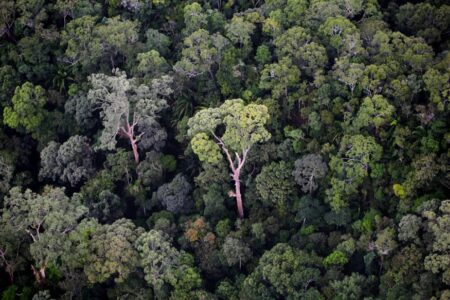Deforestation in Colombia dropped by 29 percent in 2022, falling to the lowest level in nearly 10 years, according to newly released government statistics.
The figures, published on Wednesday, show particular gains in regions of the Amazon rainforest, considered an important “carbon sink” for trapping greenhouse gas emissions in the fight against climate change.
In the span of one year, from 2021 to 2022, deforestation in Colombia dropped from 174,103 hectares (672sq miles) to 123,517 hectares (477sq miles), marking a nearly 30-percent decrease.
“This year we have a very good reduction above the target. The question is if we’re going to be able to sustain that in the year 2024, 2025 and 2026,” Environment Minister Susana Muhamad told journalists in Bogota.
Muhamad said that the government has worked with local communities to protect forests and crack down on illegal enterprises that contribute to deforestation.
The numbers come as the left-wing government of President Gustavo Petro promises to step up efforts to halt deforestation and prioritise environmental protection.
His administration has urged wealthier countries to cancel foreign debt as part of an exchange to ensure greater investment in Amazon conservation.
Regional deforestation gains
Similar initiatives have been taken in neighbouring Brazil, where the leftist government of President Luiz Inacio Lula da Silva has also cracked down on illegal logging and forest degradation.
Earlier this month, his administration announced that deforestation in the Amazon rainforest fell by 34 percent in the first half of 2023, reaching the lowest level in four years.
Lula has also appealed to the international community for help sustaining Brazil’s efforts. Since taking office in January, he has pushed for countries around the world to contribute to the Amazon Fund, a deforestation initiative in Brazil, where two-thirds of the rainforest is located.
Since Lula took office in January, Germany pledged $38m to the fund, and in May, the United Kingdom said it would contribute $101m.
Indigenous groups attacked
But criminal groups and illegal businesses have complicated efforts to stop deforestation in the Amazon, as they continue to expand their operations in the rainforest.
Meanwhile, Indigenous communities who stand up against encroachment and resource extraction on their land are frequently targeted with violence.
Just over a year ago, Indigenous expert Bruno Pereira and British journalist Dom Phillips were murdered during a trip to the Amazon. Police believe they were killed after coming across an illegal fishing scheme in the Javari Valley, a protected Indigenous territory in western Brazil.
And in Yanomami territory, illegal gold mining has sparked a humanitarian crisis, with pollution and environmental degradation leading to health problems and malnutrition.
The governments of Colombia and Brazil have linked the fight against climate change to the fight for Indigenous rights and security. But despite the positive figures released on Wednesday, some experts have cautioned against a premature declaration of victory.
“It’s a figure that is surely very unstable, vulnerable and still has many factors for it to be controllable,” said Rodrigo Botero, director general of advocacy group the Foundation for Conservation and Sustainable Development.
Source: Al Jazeera
